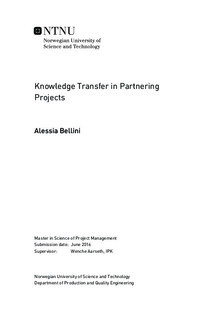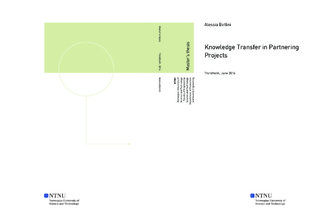| dc.description.abstract | The general purpose of this research was to investigate the perception of the link between knowledge transfer and partnering within the construction industry. From a comprehensive literature review and a set of qualitative interviews, the presence of an intricate framework emerged, which shows the presence of a strong connection between these two research areas.
Specifically, the findings revealed that the link between knowledge transfer and partnering developed in two ways, visualized as a loop. In fact, the presence of a shared collaborative culture in partnering promotes an effective knowledge transfer process in construction projects and, vice versa, an effective knowledge transfer process could set the stage for successful partnering implementation.
A preliminary literature review has been conducted on knowledge transfer and partnering, respectively, with the purpose of creating a better understanding of the research purpose and analysing how the link between these topics is considered by the authors. In particular, the theoretical framework shown that some of partnering key elements, like cooperation, open communication, and mutual trust could also enhance effective knowledge transfer in projects. In fact, according to some experts opinions, the presence of these factors promotes the creation of a collaborative shared culture that will most likely favour the transfer of tacit knowledge.
Afterwards, a set of ten qualitative interviews provided a more practical insight, showing how the researchers and the project managers recognise the link between knowledge transfer and partnering. In particular, the interview-objects also revealed a need for more practical and concreate contributions both partnering and knowledge transfer. Further researches should then performed in order to exceed the current research limitations and provide an open framework for future project improvement.
Finally, it is believable that the analysis of the link between knowledge transfer and partnering could be extremely relevant in influencing the overall project success. Partnering in projects helps to overcome the complexity and the fragmentation of the construction industry, while, at the same time, an effective knowledge transfer process is a method for achieving benefits in projects. The implementation of these elements denotes the perfect system for the achievement of positive projects performances. At the end a new perspective of the link emerges; successful partnering in projects influences effective knowledge transfer. | |

